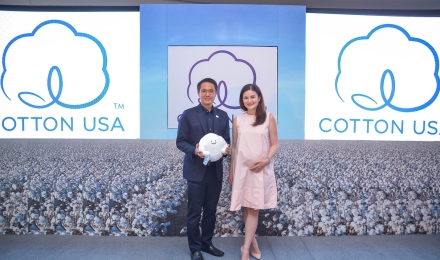
Cotton Council International (CCI), the marketing and promotions arm of the United States cotton industry, has formally re-launched its 26-year old flagship brand, COTTON USA, in the Philippines.
Since 1989, over 50,000 product lines and three billion products have proudly carried the name COTTON USA. This translates into about 100 million bales of cotton spun, woven, cut, sewn, and enjoyed by people all over the world.
“Our brand has been highly successful,” CCI President Dahlen Hancock said. “However, the global marketplace has changed dramatically and has become more competitive because petroleum-based fibers are often cheaper. The new generation of consumers needs to hear why cotton is such a wonderful product and why U.S. cotton is the premier cotton for textile and garment manufacturers and consumers, especially families.”
In the Philippines, the COTTON USA Mark was introduced to garment manufacturers and consumers in 1994. The Mark, often displayed on garments and merchandizing shelves, has been a symbol that assured Filipinos that the items being purchased were 100 percent cotton, 50 percent of which was cotton sourced from the United States of America. To date, CCI has 19 licensees divided into six categories – women’s wear, men’s wear, men’s innerwear, children’s wear, home textiles and personal care – in the country.
The benefits of cotton on skin
Cotton is a common fabric that makes up our everyday wear and clothing needs from innerwear, shirts, jeans, towels, and bed sheets. It is a natural fiber preferred especially for babies because it rarely causes allergic reactions to the skin, preventing irritation and excessive sweating.
Dermatologist Dr. Anna Palabyab-Rufino echoed the importance of using natural fibers like cotton to help prevent more complex skin conditions like textile contact dermatitis. “When choosing clothes, one should not just consider the aesthetic aspect. You should feel comfortable and pleasant when the fabric touches your skin,” she said. Dr. Rufino added that choosing non-irritant, absorbent, breathable, easy-to-wash, and natural fabrics is one way of preventing or treating these skin manifestations. In comparison, synthetic fabrics may contain formaldehyde finishing resins, dyes, glues, chemical additives and tanning agents that can be harmful to the skin.
U.S. Cotton – purity, quality and responsibility
In addition to a new logo, the re-launch includes a revitalized brand vision emphasizing three key attributes that set U.S. cotton apart from others – purity, quality and responsibility. Further, new promotional and merchandising tools will be rolled out in stages globally over the next year.
Purity: U.S. cotton is shipped pure from the field. It’s clean, non-irritating, and safe. It is the standard by which all other fibers are measured.
Quality: U.S. cotton producers take meticulous care to produce high quality U.S. cotton. Cotton grown with care is soft and white, but it takes hard work, sophisticated technology, and true craftsmanship to bring out the very best in nature. COTTON USA licensees use U.S. cotton to manufacture high quality apparels and home textiles.
Responsibility: From U.S. cotton producers to manufacturers, they are dedicated to creating a better world. Since 1980 to 2011, as result of continuous improvement, U.S. cotton producers significantly reduced five resources to produce cotton fiber. Land use has been reduced by 30 percent, soil erosion by 68 percent, irrigation water applied by 75 percent, energy use by 31 percent and greenhouse gas emissions by 22 percent. And, at the end of its journey, U.S. cotton is biodegradable and can be safely returned to earth.
In conjunction with the National Cotton Council, CCI works to promote U.S. cotton exports through COTTON USA in more than 50 countries globally, including the Philippines. With offices in Washington, Memphis, London, Hong Kong, Seoul, and Shanghai and dedicated representatives in numerous other countries, CCI plays the lead role in educating and strengthening the market for U.S. cotton and U.S. cotton products around the world.
For more information on CCI, please visit www.cottonusa.org.







